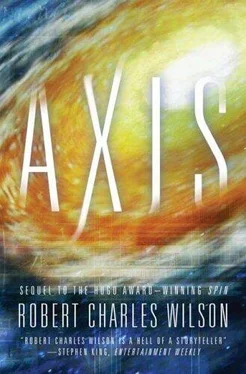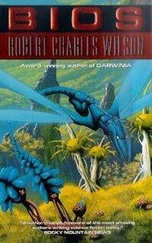"Serious?"
"It might be."
"So you want a beer? Get the dust out of your throat?"
"Not a bad idea," Turk said.
* * * * *
Turk had met Tomas aboard an ancient single-hulled tanker bound for Breaker Beach on its final voyage.
The ship, called Kestrel, had been Turk's ticket to the New World. Turk had signed on as an able-bodied seaman at negligible wages. All the crew had, because it was a one-way trip. Across the Arch, in Equatoria, the market for scrap iron and steel was booming. On Earth a leviathan like the Kestrel was a liability, too old to meet international standards and useless for anything but the poorest kind of coastal trade, prohibitively expensive to scrap. But in the New World the same rusty hulk would be a source of valuable raw material, stripped and diced by the acetylene-wielding armies of Thai and Indian laborers who made their living unrestrained by environmental regulations—the professional breakers of Breaker Beach, located some hundred miles north of Port Magellan.
Turk and Tomas had shared a mess on that voyage and learned a few things about each other. Tomas claimed to have been born in Bolivia, but he had been raised, he said, in Biloxi, and had worked the docks in that city and then New Orleans as a boy and young man. He had been at sea off and on for decades, during the tumultuous years of the Spin, when the U.S. government had revived the old Merchant Marine as a gesture toward national security, and afterward, when trade across the Arch created fresh demand for new shipping.
Tomas had joined Kestrel for the same reason Turk had signed on: it was a one-way ticket to the promised land. Or what they both liked to imagine was a promised land. Tomas wasn't naive: he had crossed the Arch five times before, had spent months in Port Magellan, knew the towns vices firsthand, and had seen how cruelly the town could treat newcomers. But it was a freer, more open, more casually polyglot city than any on Earth—a seaman's town, much of it built by expatriate sailors, and it was where he wanted to spend the last years of his life, looking at a landscape on which human hands had only recently been laid. (Turk had signed on for much the same reason, though it would be his first trip cross-Arch. He had wanted to get as far from Texas as it was practical to get, for reasons he didn't care to dwell on.)
The trouble with Kestrel was that, because it had no future, it had been poorly maintained and was barely seaworthy. Everyone aboard was aware of that fact, from the Filipino captain down to the illiterate Syrian teenager who stewarded the crew mess. It made for a dangerous transit. Bad weather had scuttled many a vessel bound for Breaker Beach, and more than one rusty keel had gone to rest under the Arch of the Hypotheticals.
But the weather in the Indian Ocean had been reassuringly benign, and because this was Turk's first passage he had risked the derision of his shipmates by arranging to be on deck when the crossing happened.
A night crossing of the Arch. He staked out a place aft of the forecastle out of the breeze, made a pillow from a hank of rag stiff with dried paint, stretched out and gazed at the stars. The stars had been scattered by the four billion years of galactic evolution that had transpired while the Earth was enclosed in its Spin membrane, and they remained nameless after thirty years, but they were the only stars Turk had ever known. He had been barely five years old when the Spin ended. His generation had grown up in the post-Spin world, accustomed to the idea that a person could ride an ocean vessel from one planet to another. Unlike some, however, Turk had never been able to make that fact seem prosaic. It was still a wonder to him.
The Arch of the Hypotheticals was a structure vastly larger than anything human engineering could have produced. By the scale of stars and planets, the scale on which the Hypotheticals were assumed to operate, it was a relatively small thing… but it was the biggest made thing Turk imagined he would ever encounter. He had seen it often enough in photographs, on video, in representative diagrams in schoolbooks, but none of those did justice to the real item.
He had first seen it with his own eyes from the Sumatran port where he joined the Kestrel. The Arch's eastern leg had been visible on clear days and especially at sunset, when the last light climbed that pale thread and burnished it to a fine golden line. But now he was almost directly beneath the apex, a different view entirely. The Arch had been compared to a thousand-mile-wide wedding ring dropped into the Indian Ocean, half of it embedded in the bedrock of the planet and the other half projecting above the atmosphere into naked space. From the deck of the Kestrel he couldn't see either leg where it entered the sea, but he could see the peak of the Arch reflecting the last light of the sun, a brushstroke of silvery-blue fading to dusky red at its eastern and western extremities. It quivered in the heat of the evening air.
Up close, people said, if you sailed within hailing proximity of either leg, it looked as plain as a pillar of concrete rising from the surface of the sea, except that the enormously wide pillar didn't stop rising, simply vanished from sight. But the Arch wasn't an inert object no matter how static it appeared. It was a machine. It communicated with a copy of itself—or the other half of itself, perhaps—set in the compatible ocean of the New World, many light-years distant. Maybe it orbited one of the stars Turk could see from the deck of the Kestrel: there was a shivery thought. The Arch might appear to be inanimate, but in fact it was watching the near surface of both worlds, conducting two-way traffic. Because that was what it did: that was its function. If a bird, a storm-tossed tree limb, or an ocean current passed beneath the Arch it would continue on its way unmolested. The waters of Earth and the New World never mingled. But if a manned ocean vessel crossed under the Arch it would be picked up and translated across an unimaginable distance. By all reports the transition was so easy as to be almost anticlimactic, but Turk wanted to experience it out here in the open, not down in crew quarters where he wouldn't even know it had happened until the ship sounded its ritual horn.
He checked his watch. Almost time. He was still waiting when Tomas stepped out of the shadows into the glare of a deck light, grinning at him.
"First time, yeah," Turk said, forestalling the inevitable comment.
"Fuck," Tomas said, "you don't need to explain. I come out every time I pass. Day or night. Like paying respects."
Respects to whom? The Hypothetical? But Turk didn't ask.
"And, oh my!" Tomas said, aiming his old face at the sky. "Here it comes."
So Turk braced himself-—unnecessarily—and watched the stars dim and swirl around the peak of the Arch like watery reflections stirred by the prow of a boat. Then suddenly there was fog all around the Kestrel, or a mistiness that reminded him of fog although it had no scent or taste of moisture to it—a transient dizziness, a pressure in his ears. Then the stars came back, but they were different stars, thicker and brighter in what seemed like a blacker sky; and now the air did taste and smell subtly different, and a gust of it swirled around the hard steel angles of the topdeck as if to introduce itself, air warm and salt-scented and bracingly fresh. And up on the high bridge of the Kestrel, the compass needle must have swung on its pivot, as compasses did at every crossing of the Arch, because the ship's horn sounded one long wail—punishingly loud but sounding almost tentative across an ocean only lately acquainted with human beings.
Читать дальше












